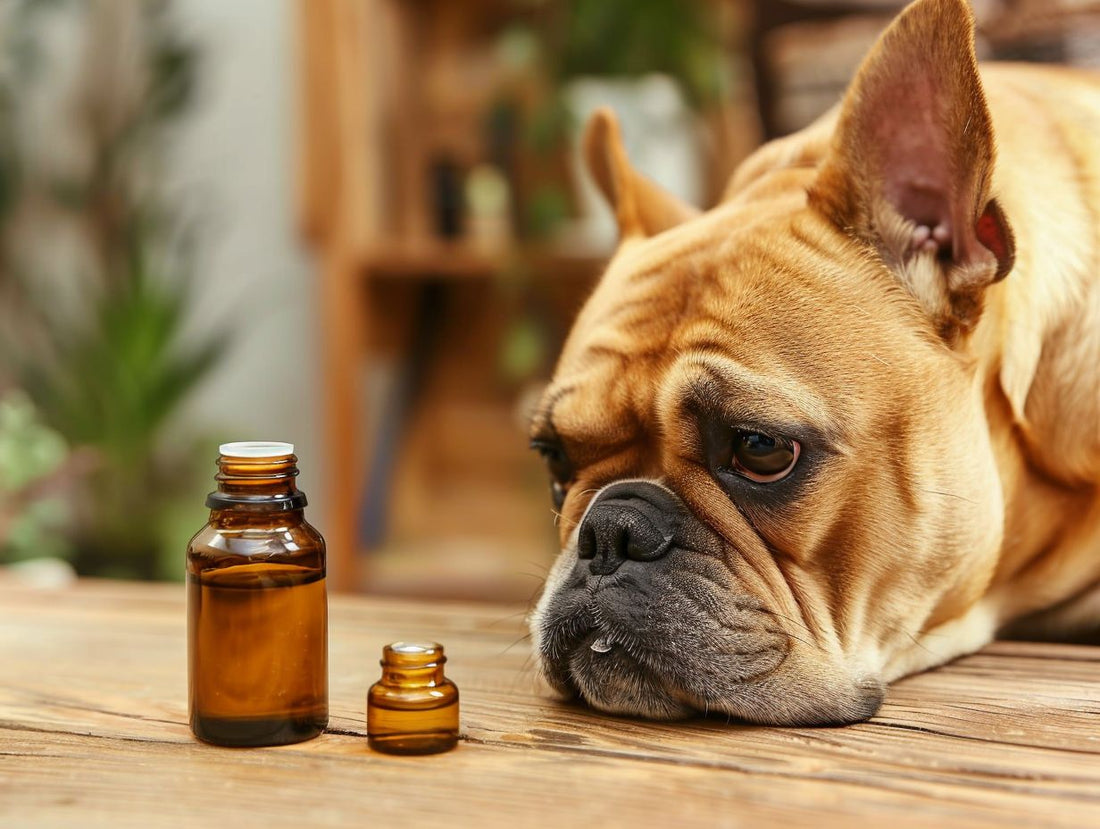
Essential Oils & Dogs: What You Need to Know
Share
Using essential oils with your pets might seem like a great idea. They're natural, generally smell pleasant, and it’s tempting to avoid medications while creating a calming, aromatic environment. However, before incorporating essential oils around your furry friends, it’s crucial to understand the safety implications, as some oils can be dangerous, even life-threatening, to pets.
Many essential oils, such as eucalyptus, tea tree, cinnamon, citrus, peppermint, pine, wintergreen, and ylang-ylang, are toxic to pets. This toxicity is present whether the oils are applied to the skin, used in diffusers, or accidentally ingested.
While diffusers might emit appealing aromas, they can pose risks to pets. Diffusers release tiny oil droplets into the air through water vapor, which can cause respiratory issues in both humans and pets, particularly in confined spaces or when used for extended periods.

Pets, especially cats and dogs, are far more sensitive to scents than humans. Dogs have around 1 million odour receptors, and the area of their brains devoted to analysing odours is 40 times larger than that in humans. What may seem like a mild fragrance to you can be overwhelming or even harmful to your pets.
Essential oils are concentrated plant extracts often used in aromatherapy and alternative medicine. While they are natural, "natural" doesn't always mean "safe."
Some preliminary research, often funded by companies selling herbal pet products, suggests that essential oils may have health benefits for pets. However, this research is still in its early stages. The potential benefits and risks should be carefully considered, and if you choose to use essential oils, it's important to select those that are safe for pets.
Products like aromatherapy diffusers, candles, liquid potpourri, and room sprays all release airborne essential oils that can be inhaled or licked off fur or paws. If you can smell the oil, it means it’s in the air, potentially causing respiratory distress in your pets.
Dogs have an incredibly sensitive sense of smell, so it's crucial to be cautious when using essential oils in your home. While placing a few drops of lavender oil on your dog’s bedding might seem like a good way to mask odours or create a calming atmosphere, it could actually cause additional stress. When used incorrectly, essential oils can lead to behavioural changes, adverse effects on the central nervous system, and respiratory issues.
Natural flea and tick treatments containing essential oils are also not recommended due to a lack of reliable data proving their effectiveness, which means they might not protect your dog at all.
Since dogs can be curious and attracted to fragrant liquids, it’s essential to keep all essential oils, even those considered “safe,” out of reach. Never apply pure essential oils directly to your dog’s skin or administer them orally.
Toxic essential oils include:
- Pennyroyal oil
- Pine oil
- Tea tree oil
- Wintergreen oil
- Cinnamon oil
- Citrus oil
- Peppermint oil
- Sweet Birch oil
- Ylang Ylang
Safe Essential oils;
- Myrrh
- Frankincense
- Chamomile
- Lavender oil
- Ginger
- Rosemary
Essential oils can pose significant risks to our pets, and there's little evidence to support their effectiveness in treating medical conditions, reducing stress or anxiety, or being used as preventative measures.
- Signs of essential oil poisoning in pets include:
- Drooling
- Difficulty breathing
- Weakness
- Trouble walking (staggering or stumbling)
- Vomiting
- Skin irritation
If your pet displays any of these symptoms and you suspect essential oil exposure, wash the area thoroughly if the oil is on their skin or fur. If you're diffusing oils, turn off the diffuser, move your pet to an area with fresh air, and contact your veterinarian or a pet poison helpline immediately.
To keep your pets safe, ensure that the oils you use are known to be safe for them. Avoid using them in small, poorly ventilated spaces, and air out rooms after use. Store essential oils in a secure place where pets can't reach or knock them over.
And keep in mind, the more diluted the oil, the safer it is.
